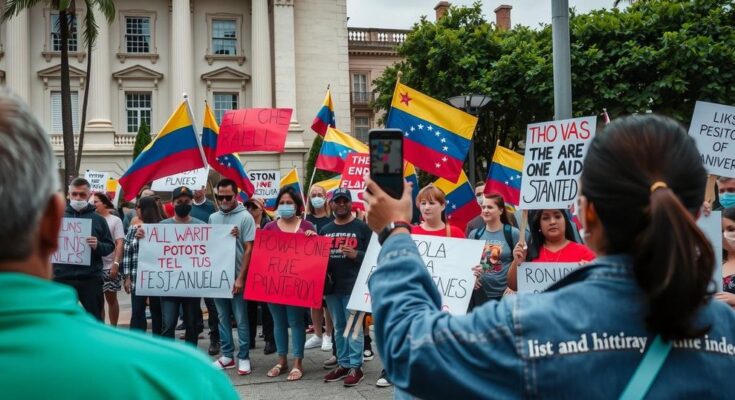Six Venezuelan government opponents at the Argentine embassy in Caracas reported police presence outside, leading to U.S. condemnation for violating international law. Vente Venezuela described the incident as harassment, coinciding with opposition leader María Corina Machado’s call for mobilization. The embassy faces power outages and communication disruptions amid increased military presence, prompting concerns over asylum-seeker safety.
In a significant escalation of tensions, six Venezuelan government opponents, having sought refuge at the Argentine embassy in Caracas for several months, reported the presence of local police and intelligence agents stationed outside the embassy for extended hours. This situation has drawn severe criticism from the U.S. government, labeling it a serious violation of international law, while Argentina’s Foreign Ministry condemned it as harassment.
The opposition members, primarily affiliated with the Vente Venezuela party led by former legislator María Corina Machado, described this development as a new siege by masked officials. This incident follows Machado’s recent call for a large-scale mobilization scheduled for December 1, leading Venezuela’s Minister of the Interior to accuse her of engaging in conspiratorial activities against President Nicolas Maduro’s regime.
According to a statement from Vente Venezuela, the embassy remains without electricity and is surrounded by regime vehicles obstructing local traffic. Additionally, communication signals in the vicinity have reportedly been disrupted. Argentina’s Foreign Ministry characterized the military presence and street closures around the embassy as a security threat, urging the international community to denounce such actions, a position echoed by the U.S.
On Sunday, the U.S. Embassy in Venezuela issued a public statement condemning the harassment of those seeking asylum, asserting that the actions taken by the Venezuelan government severely breach international law. They demanded the Maduro regime to fulfill its international obligations by ceasing these intimidating maneuvers and ensuring safe passage for asylum-seekers.
Since diplomatic relations between the U.S. and Venezuela were severed in 2019, the environment remains fraught with tension. The opposition members initially sought asylum in March following arrest warrants issued by the Venezuelan Attorney General’s Office, accusing them of promoting violence against the government.
The situation has further complicated diplomatic relations within the region. In August, Brazil agreed to safeguard its embassy as a response to the Venezuelan government’s expulsion of Argentine diplomatic personnel following President Javier Milei’s criticisms of electoral integrity in Venezuela. Subsequently, Venezuela retracted Brazil’s permission to secure the embassy, alleging misuse of the facility to plan terrorist acts, claims which Brazil and Argentina have firmly rejected.
The Venezuelan political landscape has been significantly impacted over recent years due to escalating tensions between the government and opposition groups. Many opponents of President Nicolas Maduro’s regime have sought refuge in diplomatic missions, claiming persecution. The Argentine embassy in Caracas has recently become a focal point for dissent, attracting six opponents who fled following legal threats from the Venezuelan government. This latest incident underscores the ongoing struggle between government forces and opposition factions, complicated by regional diplomatic relations, particularly between Venezuela, Argentina, and Brazil.
The ongoing situation surrounding the Argentine embassy in Caracas illustrates the heightened tensions between Venezuelan authorities and opposition figures. The reported police presence outside the embassy has attracted international condemnation, drawing responses from both the U.S. and Argentine government. This development reflects a broader pattern of political repression in Venezuela and highlights the precarious safety of those opposing the Maduro regime. As the situation evolves, the response from the international community will likely play a crucial role in addressing human rights and diplomatic integrity in the region.
Original Source: www.voanews.com




